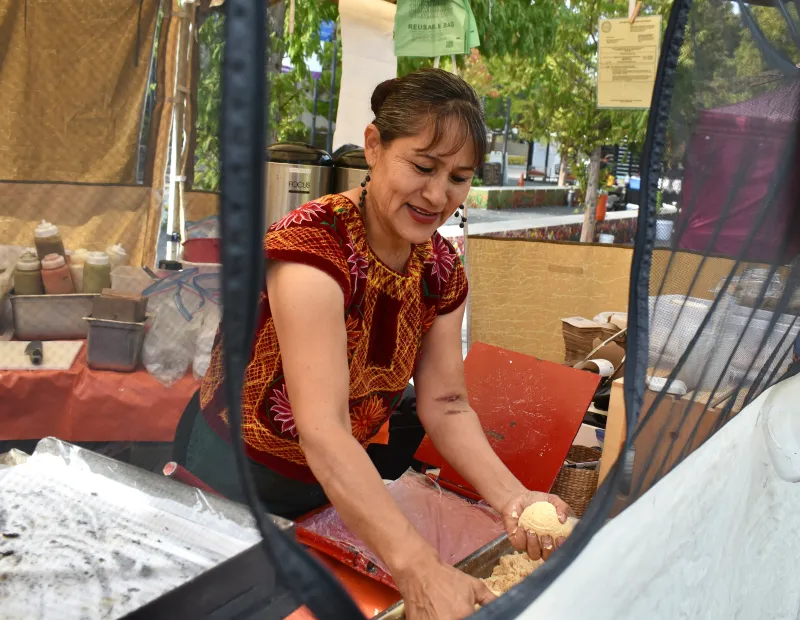The Stanford Farmers’ Market began in 2017 as a small Tuesday morning affair with a handful of food vendors outside Tresidder Union. Today, it hosts a bevy of small businesses at the heart of White Plaza — bakers, chefs, farmers and florists — every Tuesday and Thursday from 10 a.m. to 2 p.m.
The market boasts a colorful array of stall fronts offering specialties ranging from Mexican tacos and sourdough loaves to Cantonese dim sum and Thai street food. Many of these vendors have been coming to Stanford for years, selling everything from Oaxacan hot chocolate to homemade dried fruit. Here are their stories.
Eduing: The “community taco guy”
Eduing’s Kitchen is not your typical taco stand.
For almost a decade, Eduing Nuñez, the eponymous chef and owner, served fresh tacos and taught children’s cooking classes at his kids’ elementary school, Discover Charter School in San Jose. Turning “Taco Wednesdays” into a staple at the school, Eduing became known as the “community taco guy.” Nuñez saw this all as a hobby — a way to spend more time around his children while doing what he loved.
But eventually, his distinctive tacos attracted the attention of parents at Discovery Charter, who helped him turn it into a business. “It was an opportunity that presented itself… that I could make a living out of my cooking,” Nuñez said.
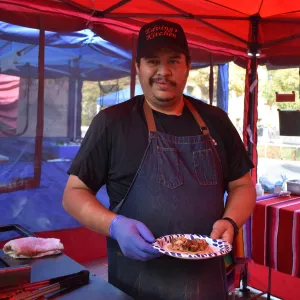

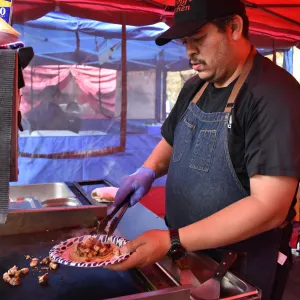
For Nuñez, family and community have always been at the heart of his business. He founded Eduing’s Kitchen seven years ago with the support of his mother and the parents of Discovery Charter, and today, his daughter occasionally helps out as the cashier. Nuñez’s favorite part of sharing food continues to be seeing the joy it brings others. “It feels good when people like your food and they let you know… when they recognize your hard work,” he said.
“No one’s doing it like Eduing,” said Carolyn Manning, a parent at Discovery Charter who now volunteers to help Eduing at farmers’ markets. Be it slices of smoky, charred tri-tip or juicy pork belly, Nuñez’s tacos promise a balanced bite of tender meats and tangy homemade salsas. “My food speaks for itself, and that’s because I’m proud of what I do,” said Nuñez.
Ronnie: The Bangkok-born chef bringing a taste of home
Rerngsak “Ronnie” Ritprasert, the owner and chef of Thai Street Food, first came to the U.S. as a young student at San Jose State University. Watching the throngs of students pass through White Plaza, Ritprasert said, brings back memories of his own undergrad experience studying computer science. Reflecting on his undergrad years, Ritprasert remembers an intense pang of homesickness each time he thought of Thailand and its vibrant food scene. Ritprasert’s mission is to re-create a sense of home through the flavors of Thai street food cuisine.
Indeed, when he can, Ritprasert uses authentic Thai ingredients from Asian marts around the Bay Area to stay true to his mother’s recipes. He is most proud of his chicken satay, which he said is marinated overnight with palm sugar and turmeric, then carefully skewered by him and his family each morning.
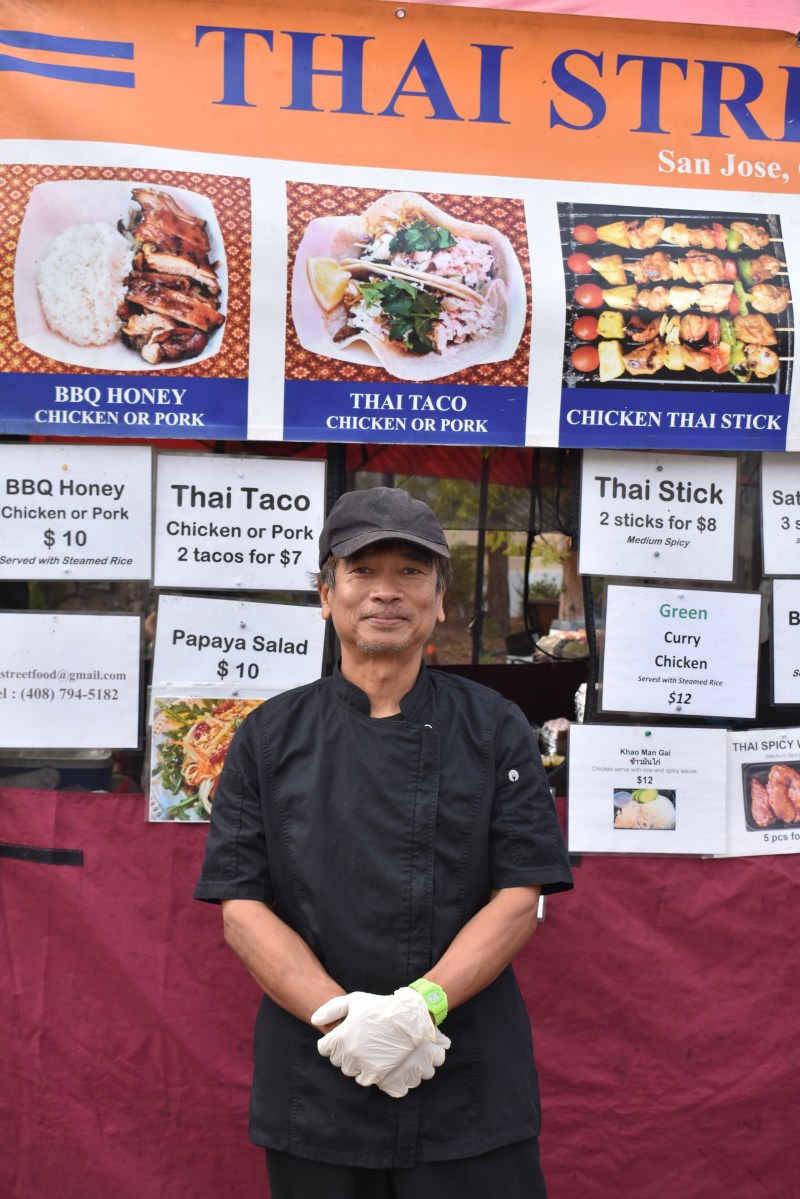
Previously the owner of three restaurants in San Jose, Ritprasert said he shifted to selling his Thai hot plates at local farmers’ markets due to unsustainable rent increases. Today, he maintains his original menu — including dishes like marinated pork over rice and roti with yellow curry — while traveling among the various markets of Santa Clara County. However, even his more flexible food stall setup is not immune to rising costs — Ritprasert estimates that since the pandemic, the price of pork per pound has more than doubled.
Despite increasing costs, Ritprasert continues serving his Thai dishes out of a fervent passion for cooking and sharing his food. “The students are so kind and so nice over here; I love it,” he said with a smile. Ritprasert, who has been coming to the Stanford Farmers’ Market since 2018, hopes that eating at Thai Street Food can become a fond memory for Stanford students to look back on after graduating.
Zaida: The single mother finding her voice through cooking
Zaida Soriano hails from Oaxaca, Mexico, where she learned to cook from her mother. For Soriano, cooking is not just a skill but a form of culture, tradition and self-expression. At her food truck, Zaida’s Kitchen, customers can find both classic dishes like carnitas empanadas and innovative twists on traditional Oaxacan fare, all served in a fresh-pressed corn tortilla and topped with her rich, creamy moles.
Soriano‘s mole coloradito is a standout — blending roasted dried chiles, spices, mashed plantains and crushed corn chips into a thick, intensely rich and perfectly balanced sauce. Soriano, who was vegan for some time, has also veganized some of her dishes, using jackfruit for carnitas and cashew cream instead of sour cream. All of her moles are vegan and gluten-free, reflecting her commitment to inclusivity and her culinary credo: “Oaxacan food is for everyone.”
Soriano, who moved to California when she was 15, previously co-owned a restaurant in Palo Alto with her husband. However, after the couple split, Soriano decided to go solo and rebranded her Oaxacan restaurant as a food truck in 2020. During that period, Soriano recalled, “I learned that I have a voice — and I have ideas.” She now brings her creations to Stanford, where she enjoys chatting with the smiling students who frequent her stall. A mother of three, including a son who graduated from Brown last March, Soriano said she understands the dedication and hard work that students put into their studies and hopes that her food can fuel them on their journey.
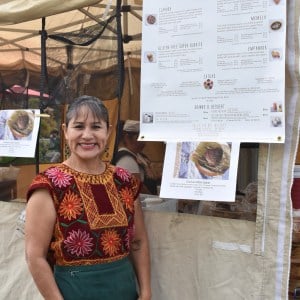
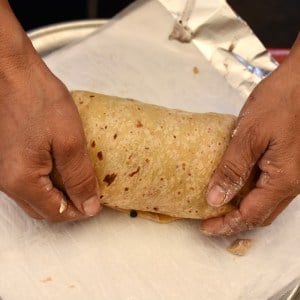
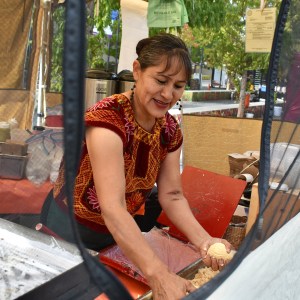
“When I talk to Stanford students, and I ask them how old they are and what their goals are, it reminds me of talking to my kids,” she said. “I see my kids every time I see them.”
To both her children and the students of Stanford, she offers this advice: “Do what you’re passionate about. It will always be worthwhile.”
Anson: The Guangzhou-born chef with a big heart and even bigger portions
Anson Lin, the owner and chef of Lin’s Dim Sum, learned to cook by making breakfast for himself before school as a child in Guangzhou, China. When he moved to the Bay as a 20-year-old, Lin carried memories of home with him through cooking, taichi and singing Cantonese opera.
Founded in 2020, Lin’s Dim Sum serves Cantonese dim sum staples like cheong fun (rolls of silky rice noodle sheets studded with bits of shrimp), lo mai gai (sticky rice with meat and vegetables steamed in a fragrant lotus leaf) and the humble bao. Lin’s personal favorite is a steaming bowl of brothy wonton mein (noodles with pork or vegetable dumplings) stained with a mix of soy sauce, sesame oil and sriracha.
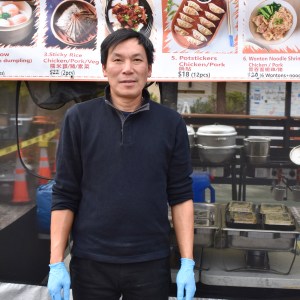
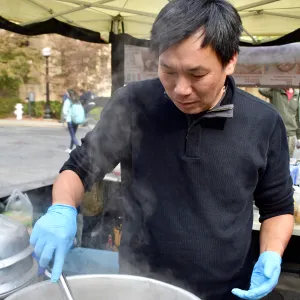
Sourcing ingredients fresh from the Asian markets each morning, Lin works until late in the night monitoring the flames for his six-hour-long beef stew and preparing dim sum for steaming the next morning.
Lin said his goal is to ensure students leave satisfied and full. With a bright smile and a mischievous glint in his eyes, he shared that he tries to prepare larger portion sizes when he comes to Stanford so that students can save their meals to reheat in their dorms if they grow hungry later that day. His hope is for students to be able to tell their loved ones not to worry by assuring them they’ve eaten that day.
Louis: The friendly college student selling bread on his gap year
Louis Leon, a Menlo Park native and undergrad at UC Davis, is taking time on his gap year to help Little Sky Bakery sell freshly baked, naturally leavened sourdough products like breads, cookies and pastries.
Little Sky’s sourdough story started in Tian Mayimin’s home kitchen in 2017. Operating across multiple farmers’ markets almost daily, the bakery also offers online orders and delivery. Little Sky’s stall boasts an impressive spread of baked goods, from hefty sourdough loaves to giant chocolate chip and oatmeal cookies the size of a fist.
Leon, who joined Little Sky and started at the Stanford storefront last summer, said his favorite part of farmers’ markets is seeing familiar faces stop by each week — he enjoys getting to know customers on a more personal level.
“When it comes to farmers’ markets, community and goodwill — actually having a conversation in the morning and checking in on how people are — go a long way,” he said.
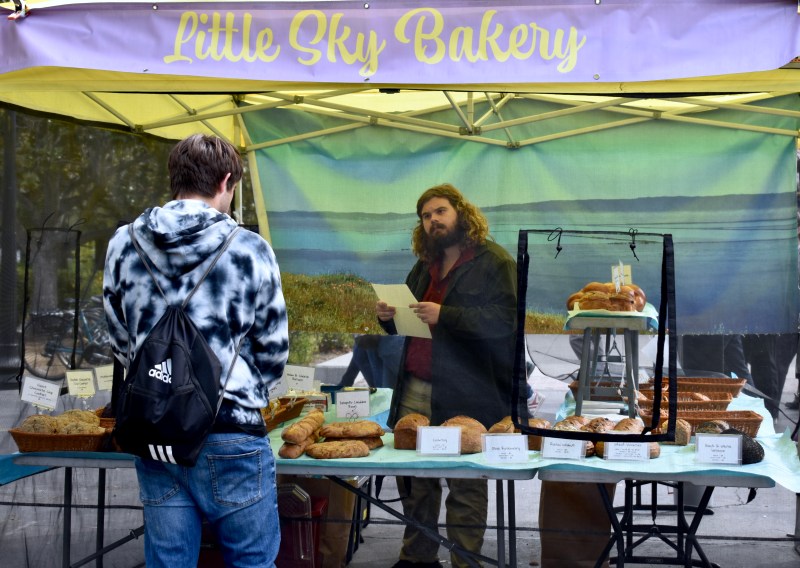
Bee and Tuyet: The mother-daughter duo
Deborah “Bee” Margolis and her mother, Tuyet Tran, stumbled into fruit drying because of the waste they saw around their hometown of Milpitas.
“Our neighbors would have so many persimmons in the fall, they would just let them drop and go bad,” said Margolis, a recent food science graduate from UC Davis. “So we would help them take them and dry them to reduce that waste.”
For over a decade now, the mother-daughter duo has cut and dried a multitude of fruits: from tropical mangoes and pineapples to summery stone fruit and, of course, Californian persimmons. Their no-frills dehydration method yields a leathery strip of dried fruit that retains much of the quintessential flavor of its fresh counterpart — all without added sugars.
Based in Milpitas, Margolis and Tran’s company, Orchard Natural, sources its fruit from local farmers in California and Mexico. In the past, the business traveled between farmers’ markets, but has scaled back after the pandemic and now only sells at Stanford, where Margolis and Tran have been coming since the campus opened to vendors in 2017.
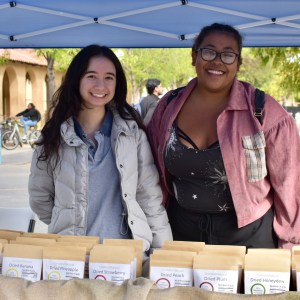

“The main difference between Stanford and other markets has to be the people,” Margolis said. “It’s not just the friendly students, but the vendors too… we’ve built a really supportive, non-competitive community.”
“You have to recognize the effort and the love that go into the things these people make,” said Nalani Santos ’24, a student who frequents Orchard Natural’s stall each week. Santos first encountered Orchard Natural after her Vietnamese friend talked with Tran, who immigrated from Vietnam in the late ’90s. “And I just kept coming back because they’re so kind and lovely,” Santos said.
On why she chooses to support small businesses, Santos said, “While it might be pricier than average… this is their life’s work, and they pour so much effort into everything. I’d rather see my money go toward real people with missions and ambitions rather than a random conglomerate.”
